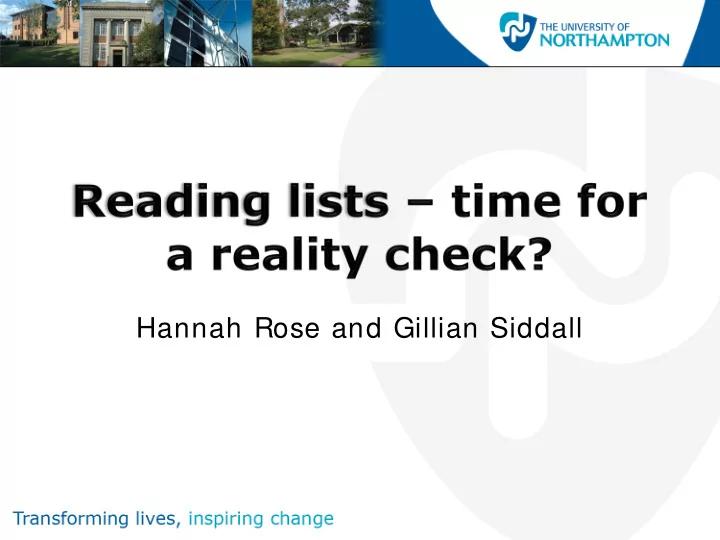

Hannah Rose and Gillian Siddall
Setting the scene University of Northampton Foundation Degrees – Education and Health
Action research Review with academics Identify an issue Reflect Plan an Find out what Observe Plan intervention students think Act Implement the annotated reading lists
Reflect Previous research Anecdotal evidence LIRG Research Award 2011 An investigation into the use of reading lists as a pedagogical tool to support the development of information skills amongst Foundation Degree students.
Plan • Literature review Read • Identified research sample • Using School contacts Sample • Planned research methods Plan • Focus groups, interviews, reading list analysis research Develop • Annotated reading lists • Conducted interviews with academic staff and focus groups with students Research
Act Reading list analysis Developed reading list checklist Selected a sample of Foundation Degree reading lists
Types of sources on a reading list Books 7% 27% eBooks 23% Book chapters Journals 9% 9% eJournals 2% 7% Specific journal articles 16% Websites Electronic resources
Use of labels 9 % 1 9 % 5 % 9 % Core 1 0 % Essential Recommended Indicative 1 0 % Suggested 3 8 % Useful Other
Reading list analysis Sample reading lists 4 2 % of information on reading lists is incorrect On average 2 3 % of the books on reading lists are out of date 2 5 % of books on reading lists are available as eBooks, but only 3 % are labelled as such On average, books make up 7 3 % of the sample reading lists The average number of sources on a reading list is 3 4 .5 items, the most is 5 9 , the least is 2 2
Act Redeveloped reading lists Interviewed academic staff
Observe Student focus groups Different subjects Different levels Ethics Recognising our limits Bias Chris Powis , Director Library and Learning Services
Reflect ( round 2 ) Analysing focus group transcriptions Thematic analysis Developing Access to skills resources Student perceptions and tutor Sign post expectations
Direction “...so if you know you need to “It can also give you an idea, even use more journals you can look if you can’t get the books, in the journal bit.” (Yr 1 student) sometimes just reading the titles can give you ideas. Whereas if you were given nothing, you probably wouldn’t know where to start at all.” (Yr 1 student) “...when you’ve been out of study for a while it’s nice to have it as a guideline and then you can go to those areas and generally find more focused areas of your own particular setting from these.” (Yr 2 student)
Model “It does make me chuckle when I get “I once found a book that was the odd reading list and I look and I on the reading list... But it think: typo , spelling m istake , error , actually had nothing to do and then we get penalised!” (Yr 2 student) with the topic. And I found myself reading it thinking it must do but it was... I think it was just a bit of a mistake.” (Yr 2 student) “ ...the inconsistencies... their own individual styles... where the journals have been referenced slightly differently. Some use a comma, some use bold, some put full stops... I’m always cautious of just directly copying straight from the reading list!” (Yr 2 student)
Scaffold “I think reading lists play an important role because it’s like being thrown into a swimming pool with lead boots on and no life saving device otherwise, and I think, it might change further on down the course, but I think particularly for new students the reading list is absolutely invaluable.” (Yr 1 student)
Justification for research “...sometimes I think the reading list is helpful. Whereas if you’re stuck what w ords to use in these search engines... You look at the reading list and it speaks a word ‘manipulative’ and you think, well I’ll try that and boom, boom, boom, you’ve got loads of w ords. ” (Yr 2 student) “I think because they give quite a variety on book lists as well you can always find something that suits your reading .” (Yr 2 student) “If you find a core text and you do some work from it you’ll find a reference in the book that leads you on .” (Yr 1 student)
W atch this space!
Questions?
Recommend
More recommend